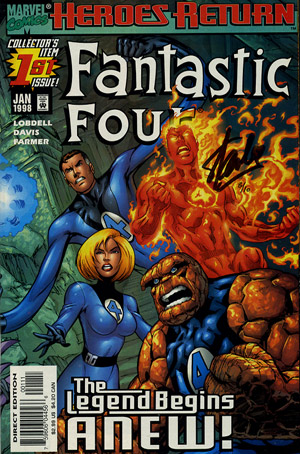The original series lasted until 1996, when Marvel almost went belly-up and sold some key properties to independent artists for a year, causing a re-launch, and new #1 for Fantastic Four in 1996. This experiment lasted about a year, and 13 issues.
Marvel re-established Fantastic Four in 1998, with a new #1 for a series lasting 79 issues, at which point, they decided to return to the original series numbering in 2004, and continued to issue #588. In 2011, there were two series in the Fantastic Four family - the Fantastic Four and a parallel series FF. Marvel decided to combine the first 11 issues of FF and the 588 issues of Fantastic Four, yielding 599 issues, and re-numbered Fantastic Four with issue #600 in 2011. What is particularly odd about this arrangement, is that BOTH series continued - FF with issue #12, and Fantastic Four with issue #600. Both series continued until issues 622 and 23 for Fantastic Four and FF respectively.
Marvel NOW re-launches both series with new #1s in 2012.
Series
|
Issues
|
Total Issues
|
"Full FF" Numbering
|
Fantastic
Four (1961) V1
|
1-416
|
416
|
1-416
|
Fantastic
Four (1996) V2
|
1-13
|
13
|
417-429
|
Fantastic
Four (1998) V3
|
1-79
|
79
|
430-508
|
Fantastic
Four (2004) V4
|
509-588
|
80
|
509-588
|
FF
(2011) V1
|
1-11
|
11
|
589-599
|
Fantastic
Four (2011) V5
|
600-611
|
12
|
600-611
|
FF
(2011) V1
|
12-23
|
12
|
612-623?
|
Fantastic
Four (2012) V6
|
1+
|
n/a
|
624+?
|
FF
(2012) V2
|
1+
|
n/a
|
FF 24+?
|
Hey Marvel - great way to handle your flagship comic. Along with Spider-Man, you could have maintained a consistency over time with the FF. I find this fake re-booting to be worse than DC's occassional re-boots of older characters to avoid the problems of long-term carryover histories that complicate storylines for new readers. You might want to consider a clean slate at some point (like the excellent Ultimate universe titles).
|
|
|
||||||
|
|
|
||||||
|
|
|
||||||
|
|
|
|

No comments:
Post a Comment